+ Open data
Open data
- Basic information
Basic information
| Entry | Database: EMDB / ID: EMD-6773 | |||||||||
|---|---|---|---|---|---|---|---|---|---|---|
| Title | Cryo-EM structure of human respiratory complex I | |||||||||
 Map data Map data | This map was obtained by sub-region refinement. | |||||||||
 Sample Sample |
| |||||||||
| Function / homology |  Function and homology information Function and homology informationComplex I biogenesis / protein lipoylation / Mitochondrial Fatty Acid Beta-Oxidation / Protein lipoylation / Respiratory electron transport / protein insertion into mitochondrial inner membrane / ubiquinone biosynthetic process / blastocyst hatching / cellular respiration / response to light intensity ...Complex I biogenesis / protein lipoylation / Mitochondrial Fatty Acid Beta-Oxidation / Protein lipoylation / Respiratory electron transport / protein insertion into mitochondrial inner membrane / ubiquinone biosynthetic process / blastocyst hatching / cellular respiration / response to light intensity / cellular response to oxygen levels / Mitochondrial protein import / iron-sulfur cluster assembly complex / mesenchymal stem cell proliferation / reproductive system development / mitochondrial large ribosomal subunit binding / respiratory chain complex / gliogenesis / mitochondrial [2Fe-2S] assembly complex / oxidoreductase activity, acting on NAD(P)H, quinone or similar compound as acceptor / mesenchymal stem cell differentiation / circulatory system development / negative regulation of non-canonical NF-kappaB signal transduction / cardiac muscle tissue development / positive regulation of mitochondrial membrane potential / response to hydroperoxide / neural precursor cell proliferation / [2Fe-2S] cluster assembly / oxygen sensor activity / cellular response to glucocorticoid stimulus / azurophil granule membrane / stem cell division / NADH dehydrogenase activity / iron-sulfur cluster assembly / sodium ion transport / ubiquinone binding / electron transport coupled proton transport / acyl binding / regulation of protein phosphorylation / NADH:ubiquinone reductase (H+-translocating) / acyl carrier activity / mitochondrial ATP synthesis coupled electron transport / positive regulation of ATP biosynthetic process / mitochondrial respiratory chain complex I assembly / proton motive force-driven mitochondrial ATP synthesis / mitochondrial electron transport, NADH to ubiquinone / RHOG GTPase cycle / respiratory chain complex I / positive regulation of execution phase of apoptosis / response to cAMP / NADH dehydrogenase (ubiquinone) activity / endopeptidase activator activity / quinone binding / ATP synthesis coupled electron transport / cellular response to interferon-beta / negative regulation of reactive oxygen species biosynthetic process / extrinsic apoptotic signaling pathway / cellular response to retinoic acid / neurogenesis / ionotropic glutamate receptor binding / substantia nigra development / Mitochondrial protein degradation / reactive oxygen species metabolic process / muscle contraction / synaptic membrane / aerobic respiration / fatty acid binding / cerebellum development / regulation of mitochondrial membrane potential / respiratory electron transport chain / response to nicotine / DNA damage response, signal transduction by p53 class mediator / kidney development / monooxygenase activity / response to hydrogen peroxide / sensory perception of sound / fatty acid metabolic process / circadian rhythm / brain development / mitochondrial intermembrane space / 2 iron, 2 sulfur cluster binding / mitochondrial membrane / multicellular organism growth / NAD binding / fatty acid biosynthetic process / positive regulation of protein catabolic process / cellular senescence / FMN binding / nervous system development / 4 iron, 4 sulfur cluster binding / response to oxidative stress / protease binding / response to ethanol / gene expression / in utero embryonic development / response to hypoxia / electron transfer activity / mitochondrial inner membrane / nuclear speck / nuclear body Similarity search - Function | |||||||||
| Biological species |  Homo sapiens (human) Homo sapiens (human) | |||||||||
| Method | single particle reconstruction / cryo EM / Resolution: 3.7 Å | |||||||||
 Authors Authors | Gu J / Wu M / Yang M | |||||||||
 Citation Citation |  Journal: Cell / Year: 2017 Journal: Cell / Year: 2017Title: Architecture of Human Mitochondrial Respiratory Megacomplex IIIIIV. Authors: Runyu Guo / Shuai Zong / Meng Wu / Jinke Gu / Maojun Yang /  Abstract: The respiratory megacomplex represents the highest-order assembly of respiratory chain complexes, and it allows mitochondria to respond to energy-requiring conditions. To understand its architecture, ...The respiratory megacomplex represents the highest-order assembly of respiratory chain complexes, and it allows mitochondria to respond to energy-requiring conditions. To understand its architecture, we examined the human respiratory chain megacomplex-IIIIIV (MCIIIIIV) with 140 subunits and a subset of associated cofactors using cryo-electron microscopy. The MCIIIIIV forms a circular structure with the dimeric CIII located in the center, where it is surrounded by two copies each of CI and CIV. Two cytochrome c (Cyt.c) molecules are positioned to accept electrons on the surface of the c state CIII dimer. Analyses indicate that CII could insert into the gaps between CI and CIV to form a closed ring, which we termed the electron transport chain supercomplex. The structure not only reveals the precise assignment of individual subunits of human CI and CIII, but also enables future in-depth analysis of the electron transport chain as a whole. | |||||||||
| History |
|
- Structure visualization
Structure visualization
| Movie |
 Movie viewer Movie viewer |
|---|---|
| Structure viewer | EM map:  SurfView SurfView Molmil Molmil Jmol/JSmol Jmol/JSmol |
| Supplemental images |
- Downloads & links
Downloads & links
-EMDB archive
| Map data |  emd_6773.map.gz emd_6773.map.gz | 26.2 MB |  EMDB map data format EMDB map data format | |
|---|---|---|---|---|
| Header (meta data) |  emd-6773-v30.xml emd-6773-v30.xml emd-6773.xml emd-6773.xml | 14.3 KB 14.3 KB | Display Display |  EMDB header EMDB header |
| Images |  emd_6773.png emd_6773.png | 23.7 KB | ||
| Archive directory |  http://ftp.pdbj.org/pub/emdb/structures/EMD-6773 http://ftp.pdbj.org/pub/emdb/structures/EMD-6773 ftp://ftp.pdbj.org/pub/emdb/structures/EMD-6773 ftp://ftp.pdbj.org/pub/emdb/structures/EMD-6773 | HTTPS FTP |
-Validation report
| Summary document |  emd_6773_validation.pdf.gz emd_6773_validation.pdf.gz | 313.1 KB | Display |  EMDB validaton report EMDB validaton report |
|---|---|---|---|---|
| Full document |  emd_6773_full_validation.pdf.gz emd_6773_full_validation.pdf.gz | 312.6 KB | Display | |
| Data in XML |  emd_6773_validation.xml.gz emd_6773_validation.xml.gz | 7.5 KB | Display | |
| Arichive directory |  https://ftp.pdbj.org/pub/emdb/validation_reports/EMD-6773 https://ftp.pdbj.org/pub/emdb/validation_reports/EMD-6773 ftp://ftp.pdbj.org/pub/emdb/validation_reports/EMD-6773 ftp://ftp.pdbj.org/pub/emdb/validation_reports/EMD-6773 | HTTPS FTP |
-Related structure data
| Related structure data |  5xtdMC  6771C  6772C  6774C  6775C  6776C  5xtbC  5xtcC  5xteC  5xthC  5xtiC M: atomic model generated by this map C: citing same article ( |
|---|---|
| Similar structure data |
- Links
Links
| EMDB pages |  EMDB (EBI/PDBe) / EMDB (EBI/PDBe) /  EMDataResource EMDataResource |
|---|---|
| Related items in Molecule of the Month |
- Map
Map
| File |  Download / File: emd_6773.map.gz / Format: CCP4 / Size: 421.9 MB / Type: IMAGE STORED AS FLOATING POINT NUMBER (4 BYTES) Download / File: emd_6773.map.gz / Format: CCP4 / Size: 421.9 MB / Type: IMAGE STORED AS FLOATING POINT NUMBER (4 BYTES) | ||||||||||||||||||||||||||||||||||||||||||||||||||||||||||||
|---|---|---|---|---|---|---|---|---|---|---|---|---|---|---|---|---|---|---|---|---|---|---|---|---|---|---|---|---|---|---|---|---|---|---|---|---|---|---|---|---|---|---|---|---|---|---|---|---|---|---|---|---|---|---|---|---|---|---|---|---|---|
| Annotation | This map was obtained by sub-region refinement. | ||||||||||||||||||||||||||||||||||||||||||||||||||||||||||||
| Projections & slices | Image control
Images are generated by Spider. | ||||||||||||||||||||||||||||||||||||||||||||||||||||||||||||
| Voxel size | X=Y=Z: 1.083 Å | ||||||||||||||||||||||||||||||||||||||||||||||||||||||||||||
| Density |
| ||||||||||||||||||||||||||||||||||||||||||||||||||||||||||||
| Symmetry | Space group: 1 | ||||||||||||||||||||||||||||||||||||||||||||||||||||||||||||
| Details | EMDB XML:
CCP4 map header:
| ||||||||||||||||||||||||||||||||||||||||||||||||||||||||||||
-Supplemental data
- Sample components
Sample components
-Entire : Human respiratory complex I
| Entire | Name: Human respiratory complex I |
|---|---|
| Components |
|
-Supramolecule #1: Human respiratory complex I
| Supramolecule | Name: Human respiratory complex I / type: complex / ID: 1 / Parent: 0 / Macromolecule list: #1-#44 |
|---|---|
| Source (natural) | Organism:  Homo sapiens (human) Homo sapiens (human) |
| Molecular weight | Experimental: 1.0 MDa |
-Experimental details
-Structure determination
| Method | cryo EM |
|---|---|
 Processing Processing | single particle reconstruction |
| Aggregation state | particle |
- Sample preparation
Sample preparation
| Buffer | pH: 7.4 |
|---|---|
| Vitrification | Cryogen name: ETHANE |
- Electron microscopy
Electron microscopy
| Microscope | FEI TITAN KRIOS |
|---|---|
| Image recording | Film or detector model: FEI FALCON II (4k x 4k) / Average electron dose: 1.25 e/Å2 |
| Electron beam | Acceleration voltage: 300 kV / Electron source:  FIELD EMISSION GUN FIELD EMISSION GUN |
| Electron optics | Illumination mode: OTHER / Imaging mode: BRIGHT FIELD |
| Experimental equipment |  Model: Titan Krios / Image courtesy: FEI Company |
- Image processing
Image processing
| CTF correction | Software - Name: CTFFIND (ver. 3.0) |
|---|---|
| Final reconstruction | Applied symmetry - Point group: C1 (asymmetric) / Resolution.type: BY AUTHOR / Resolution: 3.7 Å / Resolution method: FSC 0.143 CUT-OFF / Software - Name: RELION (ver. 1.4) / Number images used: 167761 |
| Initial angle assignment | Type: RANDOM ASSIGNMENT / Software - Name: RELION (ver. 1.4) |
| Final angle assignment | Type: RANDOM ASSIGNMENT / Software - Name: RELION (ver. 1.4) |
 Movie
Movie Controller
Controller



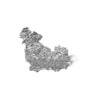

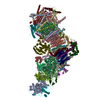

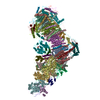
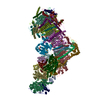


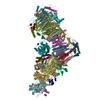
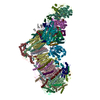
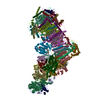
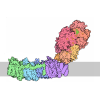

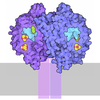


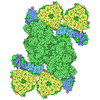


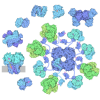

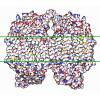



 Z (Sec.)
Z (Sec.) Y (Row.)
Y (Row.) X (Col.)
X (Col.)





















